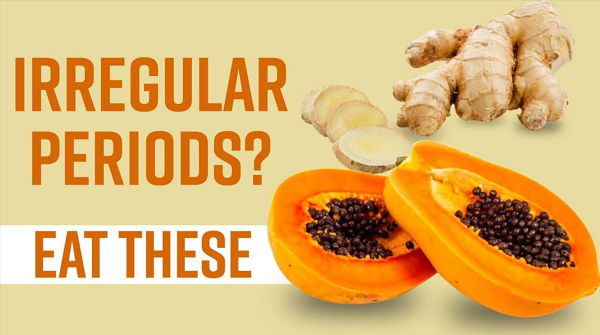According To- Food For Irregular Periods: Does Protein Help , It is extremely important to eat the right foods for irregular periods in order to maintain a healthy menstrual cycle.

Different women experience the menstrual cycle in different ways, typically lasting between 21 and 35 days. The flow usually lasts four to seven days, but it can last longer, be shorter, heavier or lighter, or more or less painful. Overtraining and low body weight can both interfere with your monthly cycle.
Identifying the cause of an irregular menstrual cycle is the first step to finding a remedy.
This is the table of contents
Irregular Periods: What Causes Them?
The primary factor affecting the menstrual cycle, other than stress, medication side effects, thyroid, and age, is lifestyle. If you maintain a healthy diet, physical activity level, and sleep schedule, your menstrual cycle will remain regular.
Irregular Period Diet
We must make good eating choices because obesity may cause hormonal imbalances and insulin level disturbances, which may lead to period irregularities. The following are some of the best foods that help regulate periods:
Fish that are oily
Oily fish, such as mackerel, salmon, and others, can help regulate your period. They are abundant in good fat, protein, and omega-3 fatty acids, which can also ease cramping and bloating.
The spice turmeric
In addition to being well-known for its therapeutic properties, turmeric can also help regulate your menstrual cycle. Turmeric also has a high antioxidant content and is warming. You can get it by drinking turmeric milk, which contains half a teaspoon of turmeric in it. If you experience irregular periods, turmeric is a good choice since it balances hormones. A cup of turmeric milk, also known as golden milk, will help decrease uncomfortable cramps during PMS.
In addition to fibre, vitamin B, and protein, whole grains can balance your body’s hormones. White bread and other foods containing high glycemic carbs, such as sweets, can intensify bleeding. You can also switch to whole wheat bread, quinoa, popcorn, brown rice, and oats. There’s a reason why it’s so good for irregular periods.
The papaya
Papaya provides you with regular periods if you miss or have a short menstrual cycle. Eat a fresh papaya before breakfast to ensure regular periods. It also improves the appearance of your skin.
The flaxseed
As a source of fibre, omega-3 fatty acids, and good fats, flaxseed is one of the healthiest seeds. Flaxseed has many health benefits. According to a study, flaxseeds contain lignans, which are thought to help with hormone balance. According to the study, patients with PCOS who took flaxseed supplements had lower levels of androgen. PCOS may cause irregular periods.
The parsley plant
Besides being a popular garnish for many foods, parsley can also be used as a treatment for irregular periods. It contains substances like myristicin and apiol that help synthesize oestrogen, which controls menstrual cycles. In addition, it stimulates blood flow within the body, which helps control period cycles.
The cinnamon spice
In addition to increasing the flavour of your food, cinnamon can also help you have regular menstrual cycles since it warms the body internally, causing more blood flow.
The pineapple
The fruit is believed to boost red and white blood cell production. It also controls blood flow and uterine lining shedding during menstruation.
Carom seeds (9)
Carom seeds have antispasmodic properties that reduce irregular menstrual cycles, as well as stimulating the uterus. Also Read-Food For Irregular Periods: Does Protein Help
The beetroot
The consumption of folic acid and iron-rich foods can minimise period bloating, as well as controlling irregular menstrual cycles. Beetroot is rich in calcium, iron, and folic acid.
Ginger, no. 11
In addition to its numerous health benefits, ginger also helps with colds, digestive issues, and can trigger your menstrual cycle thanks to its magnesium and vitamin C content.
Take one spoonful of honey and fresh aloe vera gel every morning before breakfast to manage and control your hormones.
The importance of protein intake during menstruation
It is possible for some women to become food intolerant during their periods, while for others, it may be a time when the desire for certain foods overwhelms them. It is during these periods that mood swings begin, followed by other period-related discomforts as oestrogen and progesterone fall.
As a result, our blood sugar levels can be altered, causing cravings and an increase in appetite. This may explain why many of us desire to eat chocolate, hamburgers, and chips simultaneously.
We crave foods that are high in sugar and carbohydrates, however, most of the time. When they break down inside the body, they help boost mood and give quick energy, but this energy boost is only temporary. It is therefore recommended to consume foods rich in protein during periods in order to reduce hunger and exhaustion.
Fibre also has a similar effect. For this reason, eating protein and fibre helps a menstrual woman maintain a healthy blood sugar level and give her steady energy.
Organising your meal so that you can include some protein in one manner or another, rather than giving in to your desires, can help one receive enough protein to combat lethargy during menstruation.
In the digestive tract, fibre causes more waste, while protein slows down nutrient breakdown and helps control blood sugar levels. In contrast to carbohydrates and sugar, which may cause a quick drop in blood sugar, protein and fibre keep you full and provide you with gradual, steady energy.
In conclusion
Incorporate these foods into your diet and consult a skilled nutritionist if you are aware of the underlying cause of your irregular menstrual cycles. For menstrual health to last for the long run, you should not only consume the right foods for irregular periods, but also change your lifestyle.Food For Irregular Periods: Does Protein Help